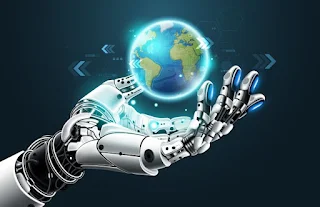New update artificial intelligence (AI)
Artificial intelligence (AI) is a branch of computer science that aims to create intelligent machines capable of performing tasks that typically require human intelligence. These tasks include learning, problem-solving, decision-making, and understanding language.
AI is a broad field with a wide range of applications, including:
* Machine learning: This is a type of AI that allows computers to learn from data without being explicitly programmed. Machine learning algorithms can be used to identify patterns in data, make predictions, and make decisions.
* Natural language processing (NLP): This is a type of AI that allows computers to understand and process human language. NLP can be used to translate languages, generate text, and answer questions.
* Computer vision: This is a type of AI that allows computers to see and interpret images and videos. Computer vision can be used to identify objects in images, track people in videos, and generate realistic images.
* Robotics: This is a type of AI that allows robots to perform tasks autonomously. Robotics can be used to build self-driving cars, create robots that can perform surgery, and create robots that can explore dangerous environments.
AI is a rapidly developing field with the potential to revolutionize many aspects of our lives. However, it is important to be aware of the potential risks of AI, such as job displacement and the potential for AI to be used for malicious purposes.
Here are some of the potential benefits of AI:
* Increased efficiency and productivity: AI can automate tasks that are currently done by humans, such as data entry and customer service. This can free up humans to focus on more creative and strategic work.
* Improved decision-making: AI can analyze large amounts of data to identify patterns and trends that humans may miss. This can help businesses and governments make better decisions.
* New products and services: AI can be used to create new products and services that were not possible before. For example, AI is being used to develop self-driving cars and personalized medicine.
* Improved quality of life: AI can be used to improve the quality of life for people with disabilities. For example, AI-powered prosthetics can help people with amputations regain their mobility.
Here are some of the potential risks of AI:
* Job displacement: As AI becomes more sophisticated, it is likely to automate many jobs that are currently done by humans. This could lead to mass unemployment.
* Bias and discrimination: AI systems are trained on data, and if that data is biased, then the AI system will also be biased. This could lead to discrimination against certain groups of people.
* Security risks: AI can be used to create new types of cyberattacks and other security threats.
* Existential risks: Some experts believe that AI could eventually become so powerful that it could pose a threat to humanity.
It is important to be aware of both the potential benefits and risks of AI. As AI continues to develop, it is important to ensure that it is used responsibly and ethically.
Here are some of the ethical considerations that need to be taken into account when developing and using AI:
* Transparency: AI systems should be transparent so that people can understand how they work and make decisions.
* Fairness: AI systems should be fair and not discriminate against any group of people.
* Safety: AI systems should be safe and not pose a threat to humans.
* Privacy: AI systems should respect people's privacy.
It is important to have a conversation about the ethical implications of AI. This conversation should involve a wide range of stakeholders, including researchers, developers, policymakers, and the general public.
I believe that AI has the potential to be a powerful force for good. However, it is important to be aware of the potential risks and to develop AI responsibly.
https://www.javaassignmenthelp.com/blog/importance-of-artificial-intelligence/
.jpg)









.jpg)
0 टिप्पणियाँ